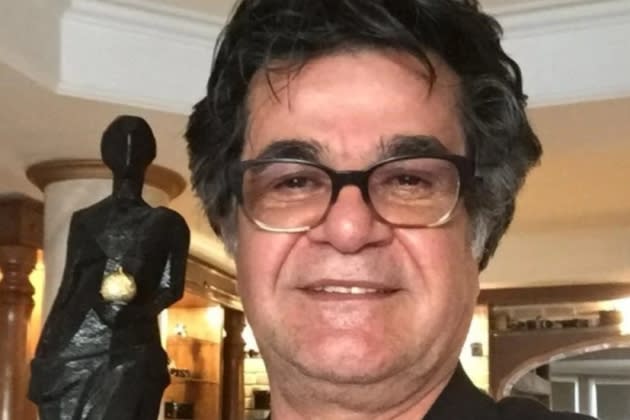
In a new statement shared with the Venice Film Festival, imprisoned Iranian filmmakers Jafar Panahi and Mohammad Rosoulof have said the “hope of creating again” is a “reason for existence.”
Venice showed solidarity with persecuted filmmakers in Iran and Turkey as part of a session co-organized with the International Coalition for Filmmakers at Risk (ICFR) that highlighted the plight of creatives in these countries, and the remaining work — and funds — required to raise awareness of their immense struggle, and fight for civil liberties.
More from Variety
Iran, in particular, is seeing a major crackdown on the filmmaking community. In early July, Mohammad Rasoulof, winner of the 2020 Berlin Golden Bear for “There Is No Evil,” and fellow filmmaker Mostafa Al-Ahmad were arrested for posting a statement on social media in the wake of a violent government crackdown. Just days later, dissident Iranian auteur Jafar Panahi, known globally for prizewinning works such as “Offside” and “Taxi,” was also arrested after inquiring about his imprisoned peers.
In the joint statement, distributed to journalists at a Saturday press conference on the Lido, the directors said: “We are filmmakers. We are part of Iranian independent cinema. For us, to live is to create. We create works that are not commissioned. Therefore, those in power see us as criminals. Independent cinema reflects its own times. It draws inspiration from society. And cannot be indifferent to it.
“The history of Iranian cinema witnesses the constant and active presence of independent directors who have struggled to push back censorship and to ensure the survival of this art. While on this path, some were banned from making films, others were forced into exile or reduced to isolation. And yet, the hope of creating again is a reason for existence. No matter where, when, or under what circumstances, an independent filmmaker is either creating or thinking about creation. We are filmmakers, independent ones.”
Introducing the ensuing panel, Roberto Cicutto, president of the Biennale, said that the political role of the org is “not to give a political judgement but to make available to the world a stage that can be under the scrutiny of everyone in order for others to draw their consequences and judge the situations being created.”
Leading the charge was the ICFR, which was launched in Venice in 2020 to “activate the film community’s collective response to cases of filmmakers facing severe risk.”
“We are here to sound a really loud alarm,” said founding member Vanja Kaludjercic. “In three years, there has been a huge increase in censorship and the imprisonment of filmmakers. The world and society at large is in a much more aggravated situation than it was two years ago. Our concerns are deeper than ever.”
The body has so far raised €420,000 ($418,000) to help filmmakers in Ukraine. Around 400 filmmakers have been given micro funds of €400-€500 ($398-$497) each. Meanwhile, in Afghanistan, the ICFR aimed to help 800 creatives at risk, and was able to assist in the successful relocation of 60% of this group.
Attention is now firmly on Iran, where high-profile cases like Panahi and Rasoulof’s have mobilized the international community. Kaveh Farnam, an Iranian producer, alleged in the session that Panahi’s arrest was premeditated by the government, as it had released a news broadcast shortly after the arrests using the previous day’s date.
“A few weeks before, they had arrested some documentary-makers,” said Farnam. “This time, they released the news by themselves. It was pre-ready news. There was a message: ‘This is the start of direct, physical harassment and attacks on Iranian independent cinema.’ These events in the last two months prove that it’s not just Mohammad Rasoulof’s arrest. It was an attack on Iranian cinema.”
Elsewhere in the session, Turkish producer Sinem Sakaoglu discussed the case of producer and journalist Çiğdem Mater, who was sentenced to 18 years in prison, together with six co-defendants. The primary accusation against her is that she was trying to raise financing for a documentary project about the Gezi Park movement that was never actually made.
“It’s a farce,” declared Sakaoglu.
Mike Downey, chairman of the ICFR, closed the session by highlighting the duty of care shared by international film community.
“The ICFR had these three major situations thrown at us in our first three years,” said Downey. “There will be something else and that’s the tragedy of what we’re doing here.”
Best of Variety
Sign up for Variety’s Newsletter. For the latest news, follow us on Facebook, Twitter, and Instagram.




